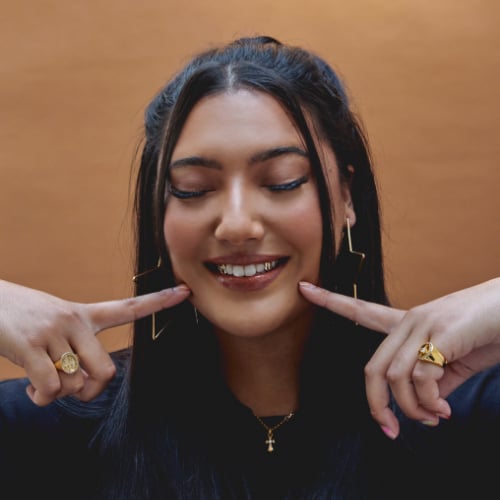How Living With Long COVID Takes an Emotional Toll
For COVID Long Haulers, It Can Feel Like the Pandemic Will Never End

Before she was diagnosed with COVID-19 in the earliest phase of the pandemic, Gaby Ochoa Perez, now 21, was a healthy young woman working and studying acting in New York City. Though Ochoa Perez had a difficult battle with COVID last April — one that left her on oxygen — she never imagined that over a year later, she would still be contending with the debilitating symptoms she experienced in the early weeks of her diagnosis. But as the months passed with no improvement, her mental health began to suffer as well. "It was really devastating seeing that many cases weren't ending well with so many deaths," Ochoa Perez told POPSUGAR. "I thought that would be my outcome as well." For a period of time, she says she lost all hope.
More than a year into the pandemic, long COVID remains somewhat of a mystery to the medical community, though post-viral syndromes are by no means a new phenomenon. The Centres For Disease Control and Prevention describes post-acute sequelae of COVID-19 (PASC), as it's now known, as "a range of new or ongoing symptoms that can last weeks or months after first being infected with the virus that causes COVID-19." People with long COVID may experience symptoms including heart palpitations, chest pain, fatigue, shortness of breath, and brain fog. The underlying causes are still being investigated, but as The Atlantic reported, doctors believe some of these symptoms may be linked to chronic fatigue syndrome or dysautonomia, a dysfunction of the autonomic nervous system, which controls processes like heart rate, blood pressure, and breathing.
For some patients, like Ochoa Perez, their symptoms simply never improve. Others may have mild or moderate cases of COVID, only to get knocked down weeks or months later. "A lot of people whose first bout wasn't that bad end up debilitated by these late-breaking symptoms that vary in terms of type of symptom, number of symptoms, severity, and duration," Noah Greenspan, PT, DPT, a cardiopulmonary physical therapist in New York, told POPSUGAR.
Roughly 50 percent of Americans are now fully vaccinated against COVID-19, opening the door for people to travel, reconnect with friends and family, and attend larger gatherings. Even as the Delta variant begins to spread, threatening the progress that's been made in the battle against the virus, there's a sense that life has finally returned to normal here in the US. But for people with long COVID (often referred to as "long haulers"), life is far from normal. Instead, they are left with more questions than answers about what's happening to their bodies, and must find ways to cope, both physically and emotionally, while they wait for the science to catch up.
The Emotional Toll of Long COVID
Especially for people who have never lived with chronic illness before, the symptoms of long COVID can be devastating. Frank J. Sileo, PhD, a licenced psychologist who specialises in treating the psychological impact of chronic illness, explained that anxiety and depression are the most common mental health issues among long haulers. While it's unclear if there's a biological connection between the conditions, "individuals with chronic illnesses often feel a host of feelings due to the isolation, loneliness, and issues with relationships at home and work, amongst other problems that accompany a chronic illness," Dr. Sileo told POPSUGAR. Anxiety was incredibly common before the pandemic, he added, and "it's definitely been exacerbated."
This was certainly true for Ochoa Perez. At the time she became infected, Ochoa Perez was an acting student and waitress renting a room in a family's apartment. She was given three days to find a new place to live, and luckily a friend of a friend knew a family who had left the city and offered for Ochoa Perez to stay in their apartment for free.
Ochoa Perez's parents were deported to Colombia when she was younger, and she recalls experiencing severe anxiety about whether she would recover. "I remember crying at night because I didn't think I would see my mom again," she said. Although she was grateful for a place to stay, the isolation further triggered her anxiety. Ochoa Perez was treated with two steroid medications starting last April, when she was at her sickest. Little did she know that certain steroids can exacerbate depression. "I would say April through August were probably the darkest moments of my life," Ochoa Perez said, adding that she was taken off the medication due to her depression.
"I get sad and angry that this is happening and I don't know why. I was a healthy 20-year-old playing hockey and now I can barely walk up the stairs," Knudsen said.
But there are a number of reasons that long haulers may feel anxious or depressed. Nicole Knudsen, now 21, is a college athlete who was diagnosed with COVID in July of last year. She lost a huge part of her identity when she could no longer play hockey. "I get sad and angry that this is happening and I don't know why. I was a healthy 20-year-old playing hockey and now I can barely walk up the stairs," Knudsen said, while speaking with POPSUGAR in June, nearly a year after she became sick. To that point, there was no clear explanation for her symptoms, which could make climbing even the few stairs to her bedroom feel like "a hard workout" that left her out of breath, nauseous, and shaky.
Because doctors themselves are still learning about this illness, it can be hard to know how long a person's symptoms will last, and that uncertainty — combined with the sense of loss Knudsen described — can make it difficult for long haulers to cope. "We're dealing with loss of a job, loss of functioning, financial loss," Dr. Sileo said. "Part of treatment is helping these individuals identify and acknowledge their grief and find ways to rebuild or make shifts in their lives."
For some long haulers, the fear that they won't be able to work through their illness is one of the greatest stressors. Debra Barb, a 36-year-old teacher in Ohio, was diagnosed with COVID in November. For several months, her symptoms were so debilitating that she temporarily moved in with her mother. "I needed help with daily sorts of things like laundry and food shopping, and even email and text messages because the brain fog was so bad during those months," Barb explained.
At first, Barb struggled with issues like word retrieval, but the brain fog got worse about six weeks into her illness. "I found myself at school, unable to take attendance," Barb told POPSUGAR. Her students were all virtual that week, and Barb typically had two devices in operation at once. "One device had my virtual classroom open, and the students were automatically alphabetized on the list by their first name. On another device I had our online grade book and attendance reporting system open, and students are automatically alphabetized by last name," she recalled. "For three days in a row, I showed up to my virtual morning classes and was not able to take attendance. The lists and names were jumbled. I couldn't focus long enough to take my eyes from one list to the next before forgetting which name I was looking for and if I was looking to mark them absent or present. It felt like my brain was in a tornado."
Of course, Barb couldn't work during this time, and it wasn't just because of the brain fog. She also completely lost her appetite, had a distorted sense of smell, and experienced sudden drops in blood pressure and increases in heart rate that were dizzying and sometimes even faint-inducing. These symptoms, she explained, "caused most of my time off from work." Once she ran out of sick days, her colleagues rallied to help her. Barb had more than 100 sick days donated to her by colleagues, which helped ease the stress, so she could fully focus on her recovery — a recovery that included treating what she describes as "the worst depression and anxiety I've ever experienced."
Although she had a bout of depression in high school and has dealt with generalised anxiety for as long as she can remember, Barb was particularly shaken by losing her sense of smell and taste, only to regain it and then suffer through another two-month period of parosmia, a condition that distorts your sense of smell. "When I started to be aware of scent again, they were all bothersome smells and none were familiar," she recalled. "I had gone a couple months without any sort of smell or taste and then when it started to come back, every flash was disgusting, just really horrible perceptions of scents." For example, Barb said that when she put something like coffee up to her nose, it would smell like gasoline. "I was smelling something that no one around me can smell, and I knew in my own head that's not how it's supposed to smell. It didn't match up with my own sense of reality," she said. "It made the depression and anxiety off the charts, like nothing I'd experienced before."
As more Americans become infected every day, there's likely to be a stream of long haulers who are experiencing these symptoms for the first time.
Now, as the world reopens, long haulers must watch as everyone around them tries to move on, while they remain stuck in neutral. When Knudsen spoke with POPSUGAR, she was struggling to get back to a normal routine, even though she and her friends were fully vaccinated. "Me going out and being active and doing things that use to be somewhat normal — whether it's going out with friends and I'm out too long, or doing physical activity where I exert myself too much — the next day I will have a flare up and have symptoms arise 10 times worse than they would if I had just stayed at home and laid around," Knudsen said, noting that her relapses often included symptoms like extreme fatigue, vomiting, joint and leg pain, and brain fog.
As more Americans become infected every day, there's likely to be a stream of long haulers who are experiencing these symptoms for the first time. Every one of them will have to contend with some sense of loss and isolation. "Feeling a little excluded is going to be a thing for the long haulers," said Barb, who the day before speaking with POPSUGAR, couldn't join her boyfriend at a baseball game because she wasn't able to stand for more than 15 minutes at a time. A former college basketball player, she also had to miss out on playing in rec leagues with her friends, who were able to return to the court when she couldn't. "There's definitely a little bit of sadness, but I think I'm growing and gaining a lot of strength from this experience," Barb said at the time. "I'm trying to turn this into a positive for my mental health."
Learning to Cope While the World Moves On
Dr. Sileo emphasised that depression and anxiety shouldn't be brushed off as an inevitable side effect of chronic illness. "[Patients] will have symptoms and people will say, 'Of course you're anxious, of course you're depressed,'" he said. "The mental health aspect isn't necessarily addressed. People need to talk about the anger and the strong emotions around getting something they didn't ask for." He expressed concern that, while society focuses on the physical aspects of COVID-19, there's also a mental health crisis on the rise. "As a country, we need to put that out there for people because this is not just a physical virus. There's a mental health component to this," Dr. Sileo said. "Don't neglect mental health or accept anxiety and depression as a side effect. Address it."
The long haulers POPSUGAR spoke with were attempting to do just that. In addition to virtual therapy, Barb began taking an antidepressant for the first time in 20 years. She's also a yoga instructor so she tapped into meditation and guided breathing.
Ochoa Perez had also used yoga as a coping mechanism, both for mental therapy and to stretch her body, and was finding happiness in things like reading, watching movies, and taking short walks with friends, as well as an oxygen tank, which had been part of her life since several days after her diagnosis, due to fluctuations in her blood oxygen saturation levels.
Knudsen had similarly found comfort in talking to a therapist, establishing a routine, and leaning on her support system. "If I'm really depressed, I go to my friends," she said. "I have such a close relationship with them and they take me away from whatever I'm going through." For long haulers, only time may heal — but doctors, therapists, family, and friends who will truly listen can make that excruciating wait just a little more bearable.







